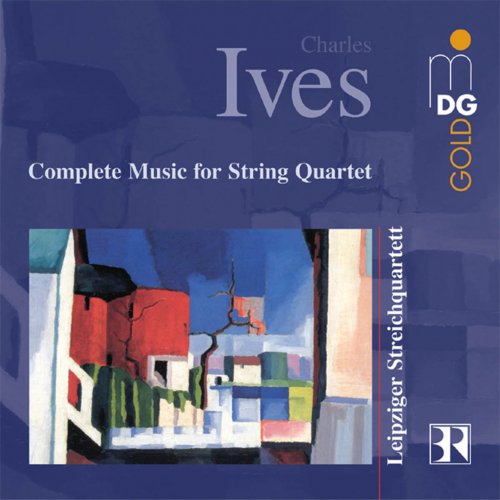
Leipziger Streichquartett - Ives: Complete Music for String Quartet (2002)
BAND/ARTIST: Leipziger Streichquartett
- Title: Ives: Complete Music for String Quartet
- Year Of Release: 2002
- Label: MDG Gold
- Genre: Classical
- Quality: FLAC (tracks)
- Total Time: 01:05:47
- Total Size: 308 Mb
- WebSite: Album Preview
Tracklist:
1. Scherzo 1:33
String Quartet No. 1
2. Andante Con Moto 4:58
3. Allegro 5:35
4. Adagio Cantabile 5:33
5. Allegro Marziale 5:18
6. Adagio Sostenuto For English Horn, String Quartet And Piano
7. Largo Risoluto No. 1 For String Quartet And Piano 3:09
8. Largo Risoluto No. 2 For String Quartet And Piano 3:27
9. Adagio Cantabile "The Innate" For String Quartet And Piano 2:28
String Quartet No. 2
10. Discussions 10:25
11. Arguments 4:53
12. The Call Of The Mountains 13:10
13. Hallowe'en For String Quartet And Piano 2:14
Performers:
Leipziger Streichquartett
1. Scherzo 1:33
String Quartet No. 1
2. Andante Con Moto 4:58
3. Allegro 5:35
4. Adagio Cantabile 5:33
5. Allegro Marziale 5:18
6. Adagio Sostenuto For English Horn, String Quartet And Piano
7. Largo Risoluto No. 1 For String Quartet And Piano 3:09
8. Largo Risoluto No. 2 For String Quartet And Piano 3:27
9. Adagio Cantabile "The Innate" For String Quartet And Piano 2:28
String Quartet No. 2
10. Discussions 10:25
11. Arguments 4:53
12. The Call Of The Mountains 13:10
13. Hallowe'en For String Quartet And Piano 2:14
Performers:
Leipziger Streichquartett
Charles Ives’s innovations, his seemingly cluttered experiments, his use of quotation (from indigenous folk-tunes to Beethoven’s Fifth!) and his visionary ability to suggest and collide his childhood (Holidays Symphony) and look beyond ourselves (The Unanswered Question) has his detractors seeing him, at best, as eccentric. This CD brings maximum contrast from the off – first comes the 90-second Scherzo, gnarled and angular, from a European acolyte of radical Schoenberg maybe, which is followed by the hymnal opening of the First Quartet, music that became the third movement of Ives’s remarkable Fourth Symphony, and which could easily have been composed by Dvorak in America, save the harmony wouldn’t have ’slipped’ so much! This Quartet, completed in 1902, is in the conventional four movements. The second is a pleasing take on folksong, sometimes half-heard as in the Second Symphony; the slow movement sings sweetly and the ’Finale’ marches to a church gathering.
In the First Quartet, Ives can be heard tweaking Mendelssohn, Schumann and Dvorak. Adagio sostenuto (quartet plus cor anglais and piano) is more sea-misty and melodically fragmentary – more Ivesian if you will. Of the four pieces for quartet and piano, the two called Largo risoluto are not only recognisably Ivesian and thus more American – Ives invented American Music – both are also passionate and exhaustively ’modern’. The Adagio cantabile is more intimate and sparing, more distant. Hallowe’en scampers to string clusters and a disruptive piano before a recognisable cadence heralds some bass drum bangs.
The most substantial work is the half-hour Second Quartet written over several years to 1913, and thus contemporaneous with the concept of the all-embracing and ’free’ Fourth Symphony. It vividly encapsulates Ives’s eclectic mix. The Quartet’s second movement, ’Arguments’, can be heard as anticipating the densest Schoenberg, and beyond him. The first movement also has looks forward, yet I can’t help feeling it would be even stronger if Ives had avoided one or two ’churchy’ references. ’The Call of the Mountains’, the last movement, is a very personal, restrained and slow memorial to a tranquil haven, maybe something unattainable.
This superbly played and recorded CD – three of the Leipzig Quartet’s members are previously first-desk players in the Gewandhaus Orchestra – offers a very useful complete collection that helps add to our appreciation of Ives. Wolfgang Rathert writes a sympathetic and informed booklet note. I strongly recommend the Leipzig Q’s account of Mendelssohn’s Opp.12 & 13 [MDG 307 1055-2]. Schumann’s three quartets would be very welcome too.
In the First Quartet, Ives can be heard tweaking Mendelssohn, Schumann and Dvorak. Adagio sostenuto (quartet plus cor anglais and piano) is more sea-misty and melodically fragmentary – more Ivesian if you will. Of the four pieces for quartet and piano, the two called Largo risoluto are not only recognisably Ivesian and thus more American – Ives invented American Music – both are also passionate and exhaustively ’modern’. The Adagio cantabile is more intimate and sparing, more distant. Hallowe’en scampers to string clusters and a disruptive piano before a recognisable cadence heralds some bass drum bangs.
The most substantial work is the half-hour Second Quartet written over several years to 1913, and thus contemporaneous with the concept of the all-embracing and ’free’ Fourth Symphony. It vividly encapsulates Ives’s eclectic mix. The Quartet’s second movement, ’Arguments’, can be heard as anticipating the densest Schoenberg, and beyond him. The first movement also has looks forward, yet I can’t help feeling it would be even stronger if Ives had avoided one or two ’churchy’ references. ’The Call of the Mountains’, the last movement, is a very personal, restrained and slow memorial to a tranquil haven, maybe something unattainable.
This superbly played and recorded CD – three of the Leipzig Quartet’s members are previously first-desk players in the Gewandhaus Orchestra – offers a very useful complete collection that helps add to our appreciation of Ives. Wolfgang Rathert writes a sympathetic and informed booklet note. I strongly recommend the Leipzig Q’s account of Mendelssohn’s Opp.12 & 13 [MDG 307 1055-2]. Schumann’s three quartets would be very welcome too.
DOWNLOAD FROM ISRA.CLOUD
Leipziger Streichquartett Ives Complete Music for String Quartet 02 2607.rar - 308.2 MB
Leipziger Streichquartett Ives Complete Music for String Quartet 02 2607.rar - 308.2 MB
As a ISRA.CLOUD's PREMIUM member you will have the following benefits:
- Unlimited high speed downloads
- Download directly without waiting time
- Unlimited parallel downloads
- Support for download accelerators
- No advertising
- Resume broken downloads


